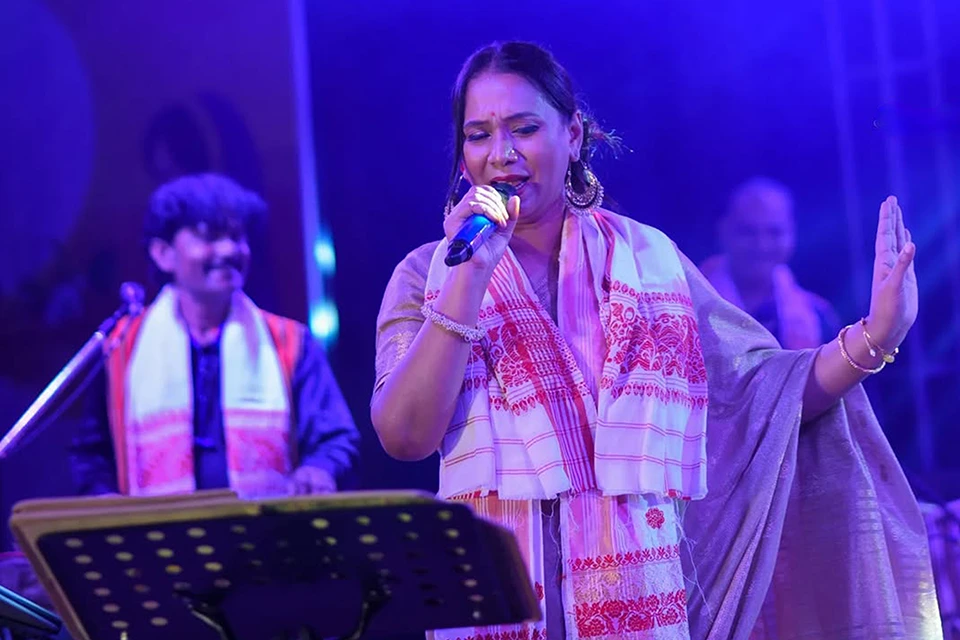Let’s embrace and celebrate the rhythmic journey of Kalpana Patowary, where melodies know no language and how an Assamese voice rules Bihar.
Updated on :
Share this post
Assam’s daughter Kalpana Patowary has always been a vibrant personality to talk about. From singing folk songs from different parts of Assam to ruling the Bhojpuri music industry, she has dedicated her life to music.

We all admire our Assam artist Kalpana Patowary as the Bhojpuri Queen of India. With her numerous hits and energizing performances, Kalpana has set a benchmark with her work all over the country. Be it Goalporiya folk songs or Bhojpuri folk, Kalpana has given her voice to a collection of soulful music in her career.
But to every artist, there’s a hidden side that is lesser known to the world. A creative space that inspires them to craft their art with complete heart and soul. Kalpana Patowary is one such name that defines the essence of folk music in India. A truly original voice that sets the stage on fire whenever she sings.
A Familiar Route
It can be easily said that Kalpana Patowary didn’t choose music, but the music chose her. In other words, she didn’t aim to become a singer from her early days, but being born and brought up in the house of an artist truly leaves a mark. She is the daughter of popular folk artist of Assam, Bipin Patowary, and that’s how her musical journey began. More than the father and daughter bond, they shared a beautiful relationship of guru and student. She started performing on stage at a very delicate age of 4.
Her father trained her with Assamese Kamrupiya and Goalporiya folk music and even took her to various regional competitions. She completed her education at Cotton College, Guwahati, in English honors, and later, during her teenage years, she learned Indian classical music in Lucknow. She studied Sangeet Visharad in Indian classical music from Bhatkhande Music Institute University, Lucknow.
The Journey Unknown
From Lucknow to Bihar to Assam, Kalpana Patowary has captured the essence of folk music, travelling from place to place before she could finally claim her Bhojpuri territory. She started her playback journey in a very muted and laid-back manner. She moved to Mumbai in 2001, and that’s where Kalpana grabbed the chance to give her voice in multilingual tracks.
Initially she sang bhajans in various languages, and while exploring different tunes, she sang quite a few Bhojpuri songs without even understanding the language properly. This later led her to Bihar, where she could capture the raw essence of Bhojpuri folk. In Mumbai, she had the opportunity to collaborate with renowned artists like Trilok Gurtu, working together on some jazz and folk fusion.
Kalpana Patowary also debuted her first commercial Assamese song in the movie Kanyadan in 2002. In 2003, her first Bhojpuri devotional track was released, named ‘A Ganesh k papa,‘ and she gained popularity through that. She also started her acting career in the Bhojpuri industry with the movie ‘Chalat Musafir maholiyo re.‘.
The Bhojpuri Queen
Kalpana Patowary is among the few notable figures who have popularized Bhojpuri traditional music by fusing it with modern styles. The fact that Kalpana Patowary was the first Bhojpuri singer to bring the ancient ‘Birha’ custom to a global audience is noteworthy.
With Dhruv Ghanekar as the composer, she performs Bhojpuri ‘Khadi Birha,’ a traditional genre of the Ahirs, Uttar Pradesh, for the first time in music history in the highly anticipated MTV Coke Studio Season 4. Actually, Khadi Birha is a really uplifting song that explains how folk culture aids migrants in overcoming the grief and loss they experience while leaving their native lands.
In addition, she is the first female vocalist to record songs in the Chhaprahiya Eastern style. When she released her Bhojpuri musical documentation on Bhikhari Thakur, popularly referred to as the Shakespeare of Bhojpuri literature, she received international praise.
Reality shows and Representation
When Kalpana Patowary appeared on the singing reality show “Junoon kuch kar dikhane ka” in 2008, it served as the platform for her recognition and the stage on which she exquisitely portrayed Assamese traditional music.
Her life changed as a result of the national acclaim she received for her distinctive vocals and superb multilingual playback. She made an impression on judges like Ustad Rahat Fateh Ali Khan and Ila Arun with her performances of Dr. Bhupen Hazarika and Bihu geet. Anu Kapoor gave her the title ‘Tribeni’ as an amalgamation of Assam, Uttar Pradesh, and Bihar.
Her dream came true when she joined Coke Studio in 2014 and sang the Rajasthani folk song ‘Baisara Beera‘ along with Papon. It’s a melodious track still popular among the mass.
A Love that Demands Sacrifice
Kalpana had to decide between her family and her love at one point in her life. Kalpana Patowary fell in love with her childhood friend Parvez Khan at the start of her career, and he asked her to marry him. Their marriage had to overcome numerous personal challenges in order to survive, just like the many other inter-religious marriages.
Due to religious differences, Kalpana’s family disapproved of her desire to marry Parvez, but sometimes love knows no boundaries. She eventually decided to leave her family and relocate to Mumbai after going through a number of struggles and heartaches. She speaks positively of her husband, praising his love and support, which have always helped her to make progress.
In an interview with Scroll, she said, “I was a Hindu in love with a Muslim. I was an Assamese singing Bhojpuri music. I like the idea of knowing and learning about new cultures. I never knew Hazrat Muhammad. I knew only Bholenath, Shiv, and I was brought up in a Vaishnav Bhakti culture.
But I’ve never thought from the perspective that many educated people have in our world today—that one belief is right, and one is wrong. I’ve taken interesting aspects of different religions and cultures and seen what is useful. There’s a beauty in this.”
Endnotes
Kalpana Patowary was greatly influenced by Dr. Bhupen Hazarika, as was her father. He sang about common people’s difficulties. So, she began looking within her own music for Dr. Bhupen Hazarika’s ideas and principles. She first discovered Mahendra Misra, also known as Misirji, the founder of the Purbi form, and Kavi Vidyapathi, a Maithili writer.
And finally, the name that most appealed to her was Bhikari Thakur. She has talked about Dr. Bhupen Hazarika in several interviews. About applying his philosophies in life and idolizing such a great persona. It has somehow shaped her into the person she is today.

Rimjim Bora is a passionate researcher, writer, and storyteller. Being an Assamese, she takes pride in writing the vibrant stories of Assam, sharing its essence beyond the region. Contact Rimjim at rimjim@diversityassam.com.


